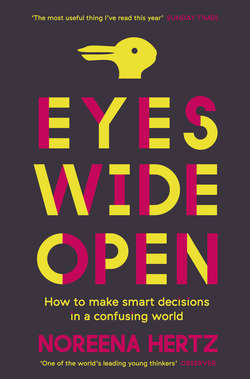Читать книгу Eyes Wide Open: How to Make Smart Decisions in a Confusing World - Noreena Hertz - Страница 33
Beware of Anchors When Buying a House
ОглавлениеIn Germany, a group of 177 senior trainee lawyers were asked to put themselves in the position of a trial judge having to pass sentence in a rape case.11
They were given key aspects of the case to evaluate, including witness statements, expert appraisals and copies of the penal code related to the incident.
However, there was a twist. As they were appraising the case in the courtroom environment, the ‘trial judges’ were interrupted by a heckler. Although this is a common occurrence in emotionally charged legal cases, in this case it was a set-up. The heckler was an actor. And the judges were exposed to one of two types of heckler.
The first pretended to be a boyfriend of the victim, and shouted out to the court, ‘Give him five years!’ The second acted as a friend of the accused, and yelled, ‘Let him go free!’ The judges were then asked to reflect briefly on the interruption and pass sentence.
The results were pretty astonishing.
Even though our judges knew that they should ignore the heckler’s interruption – especially as they understood that it was a biased opinion, with the heckler pushing either for leniency or for harsh sentencing depending on his supposed relationship to the accused or the victim – there was a marked variance in response between the judges who were exposed to the ‘Give him five years’ heckler and those interrupted by the ‘Let him go free’ one.
Judges who were confronted with the ‘Give him five years’ remark pronounced on average a sentence of thirty-three months. Those who were confronted with the ‘Let him go free’ remark pronounced on average a sentence of twenty-three months – almost a third less in length.
The judges had ‘anchored’ their sentencing decisions around a biased interjection from a heckler, and had set aside much of the other information provided to them.
If even such highly trained information evaluators can make mistakes like this, it’s not surprising to learn that we are all prone to similar ‘anchoring’ errors.12
People asked to write down the number formed by the last two digits of their social security number, for example, and then asked what bid they’d be willing to make in an auction, anchored the bid around that number.13 Even though the number couldn’t possibly (except by coincidence) be connected to the value of any object in the auction, they unconsciously based their bids on it. Decisions as varied as the amount people are willing to pay for a house or bid in an auction, and the amount of damages juries award, have also been seen to be affected by similarly spurious numerical considerations.
In each of these cases, the higher the number people unconsciously fixated on, the higher the number they gave as their decision. This is why real-estate agents will usually show you the most expensive house first – so that others will seem cheap by comparison; or, more pertinently, will seem cheap when compared to the ‘anchor point’ they have established in your mind.14
So how can we avoid unwittingly basing a decision on an inappropriate number? For we are often asked to make decisions that, whether by manipulation or chance, involve anchors lodged in our minds.
First we need to reflect upon whether a number is actually the right thing to be focusing on at all – to remember one of the lessons in the previous Step: not everything that can be counted, counts.
Assuming that in this case the number is relevant, one thing you might want to try is to ask yourself whether there is anything you might be anchoring your decision on. And if there is, whether that anchor might be inappropriate or misleading. Studies show that simply by asking ourselves this question we are able to override the anchor’s effects.15
